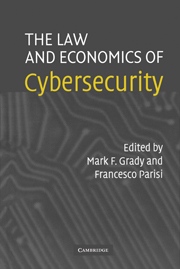The Law and Economics of Cybersecurity: An Introduction
Published online by Cambridge University Press: 18 August 2009
Summary
Cybercrime imposes a large cost on our economy and is highly resistant to the usual methods of prevention and deterrence. Businesses spent about $8.75 billion to exterminate the infamous Love Bug. Perhaps far more important are the hidden costs of self-protection and losses from service interruption.
Unlike traditional crime, which terrorizes all but has far fewer direct victims, cybercrime impacts the lives of virtually all citizens and almost every company. The Computer Security Institute and the FBI recently released the results of a study of 538 companies, government agencies, and financial institutions. Eighty-five percent of the respondents reported having security breaches, and 64% experienced financial loss as a result (Hatcher 2001). Because this problem is growing on a daily basis, it is imperative that society identify the most economically efficient way of fighting cybercrime. In this volume, the authors present a cross section of views that attempt to identify the true problems of cybersecurity and present solutions that will help resolve these challenges. In the first section, two authors outline some of the major problems of cybersecurity and explain how the provision of cybersecurity differs from traditional security models.
Bruce Kobayashi examines the optimal level of cybersecurity as compared with traditional security. For example, while it might be more efficient to deter robbery in general, individuals may find it easier to simply put a lock on their door, thus diverting the criminal to a neighbor's house.
- Type
- Chapter
- Information
- The Law and Economics of Cybersecurity , pp. 1 - 10Publisher: Cambridge University PressPrint publication year: 2005



